Photo by Trip Burns.
After following Jackson State University head basketball coach Wayne Brent up a spiraling staircase, we reached our destination—a door nearly disguised in what looked like a nook in a hallway. Brent took keys from his dapper suit, unlocked the door, and we stepped into his office. Music was playing in one corner as we entered. Brent quickly turned down the radio, while I could see the office was very Tardis-like, considering the space it actually claimed in this area of the Lee E Williams Athletic and Assembly Center.
Brent's desk was the widest and longest desk I think I have ever seen, next to a huge aquarium. The chair behind the desk looked like a comfortable throne fit for the man who now leads the Tigers basketball program.
As I sank down into a cushy chair, I noticed that it made Brent's desk and his position look much higher than mine. I felt like I was sent to the principal's office as Brent explained that I was sitting where players and others who made mistakes were also asked to sit.
It was the right choice if you weren't on the coach's good side. As Brent and I talked, I was surprised at the open and honest answers he gave me. He was focused and excited about the challenge of turning around Jackson State University basketball.
In his first season as head coach, this Provine High School graduate has guided the Tigers to a 7-14 overall record and 3-6 SWAC record so far.
As a successful high school coach, what about the JSU job convinced you to jump into college?
I wanted to be a college coach. I left Provine High School in 1998 to be an assistant coach at Ole Miss, the University of Mississippi. I went to Ole Miss as an assistant coach thinking that I would become a head coach after five or six years, and it didn't happen. And you know, you look back on your career, and you don't want to question God and ask him why it didn't happen. The only thing you know is that it didn't happen. I had to come back down and go the high school route, but that was my ultimate goal—to be a college head coach one day.
What happened at Ole Miss that kept you from making that next step?
I went to Ole Miss the first four years, and we were really, really successful. We ended up going to the Sweet Sixteen, went to the NCAA Tournament three times and the NIT once. Then we hit a rough spot, and then the next two years, we didn't have the kind of season we thought we were going to have. And at that point, in my career I'm in a situation where I'm looking at maybe I can't move from here (as an Ole Miss assistant to a college head coach). Because we weren't winning, and nothing was going right. Then I ended up coming to Piney Woods ... and I was there for three years and ended up going to Callaway (High School) for six years.
The first time when I was at Ole Miss when coach Anderson got the job at Jackson State was 10 years ago. I interviewed at the Final Four, came back and interviewed with Dr. (Ronald) Mason, and everyone around Jackson was telling me, "you're going to get the job; you're going to be the next coach." And then it didn't happen, and that was a shock, and that was a surprise. That was probably the lowest part of my career because I knew how hard I had worked to get the job. I tell people all the time that I didn't question my faith or my God. The only thing I did was ask to put me in the place you want me to be. ...
But going back and looking at it, I went to Piney Woods, and I coached the No. 1 player in the country, Renardo Sidney (who went on to play at Mississippi State). I moved to Callaway and coached the No. 1 player in the country LaQuinton Ross (who is currently at Ohio State) that year. And then last year I had another No. 1 player in the country, Malik Newman (who is still at Callaway). So I got blessed by going backwards and going to high school and then, coming into my life, I run into three players that are ranked No. 1 player in the country during those separate years. At that point, I wasn't even trying to go to college, and I was fine where I was at Callaway High School. We were winning games, I got the No. 1 team in the state and, all of a sudden, the Jackson State job comes open. And it is just a blessing from God.
What was the state of the basketball program when you got hired, and what changes needed to be made to make the program more successful?
The thing about the Jackson State job, it was just like all of my previous jobs. They were all in a rebuilding stage. My first job at Provine High School was, I tell everybody, it was not in the best shape. The guys that were there were all gone when I got there. When I got to Piney Woods, everybody was gone, and I had to start over. When I got to Callaway, everything was gone and I had to start over. Then when I got to Jackson State, we had seven or eight or maybe nine players coming back, and they all decided to transfer. So we started from rock bottom.
Once we got ready for summer school, there ere only two guys left on that previous team, I guess, from the previous staff. So each job that I had was something that had to be built from the ground up. And we are in that process now, trying to lay the foundation and trying to build the program back up.
JSU is in a one-bid conference (the SWAC) for a berth in the NCAA Tournament. What needs to happen for the program to battle for at-large bids?
You know the only way you can get an at-large bid is you would have to play guaranteed games, which we already do, and we would have to play people like Memphis, LSU, Mississippi State, Ole Miss and Southern Miss, Georgia Tech and Alabama. You would have to play teams in those power conferences, but the problem is you've got to win those games, and they are all on the road. Anytime you play a guaranteed game, you are going into a game where they are going to give you $80,000 to $85,000 to $90,000, but it's going to be very difficult to win.
So in a league like the SWAC, like we are in, the ultimate goal is to win ... your conference tournament so that you can advance to the NCAA Tournament. Because the other way is almost, you don't want to say impossible, but you are asking to play 12 guaranteed games all on the road, and they are going to give you $80,000 or $85,000, and then you have to go in and beat them on their home court. That just doesn't happen. Just doesn't happen.
JSU played most of the non-conference slate on the road. Can you get some of the teams to play in Jackson?
The only way you can do that is what we did this past year. We have to find people who, I guess, are not in the money situation we are in but are a little bit better off than we are, like a Southern Miss, Louisiana Tech and Louisiana-Lafayette. We played those three teams this year, and two of them we played here, Louisiana-Lafayette and Louisiana Tech, and in return we have to go to them next year. Now, Southern Miss signed a four-year deal, but we started at Southern Miss this year. Next year, Southern Miss will come to us.
Now you can't do that at Ole Miss or Mississippi State because they are in a power conference. They don't need that game to where they have to come to you for free and you come back to them. You would have to be able to pay $80,00 or $90,000 and then your RPI* would have to be high for them to have to come to you. And that is a stretch.
- The Rating Performance Index measures the strength of a schedule and how well a team does against that schedule—one of the ways the NCAA selection committee picks at-large teams and seeds every team for the NCAA Tournament.
College sports are becoming more and more about money, and men's basketball is one of the few revenue-producing sports. How does revenue and the need to fund other sports help and hurt the basketball program?
When I got the job here, we had X amount of dollars we had to raise and bring in, and none of those monies goes back to your program. But when you are at a school similar to ours, you have to be willing to help everybody else. Because somebody had to help me get the job. So, you know I don't mind going out, playing the game and helping the other non-revenue sports. Because it gives them the opportunity to go play their games. And I think for me, it's a way for me to say, "OK, I helped somebody else do something." Because like I said, somebody had to help me get the job here, and I look at it as a way for me to give back.
We play guaranteed games; yes, they are tough, you are on the road, and they are very difficult. And we were fortunate enough to win four of those games during the non-conference season. But I look at as a way to help other people, whether it's the soccer team, tennis, golf or whatever other sport it is. I look at as a way to work with each other because you get something out of it in the long run.
What were your goals this season?
I think my main goal was to clean the program up from an athletic standpoint and an academic standpoint. To lay the foundation of a tough hard nose, toughness and disciplined program. I wanted to get that foundation laid my first year. And that is the most challenging part of getting a job or starting over. From going to Provine to Piney Woods to Callaway, and now at Jackson State, all of them were similar in that you had to lay that foundation. And when you lay that foundation, it takes a lot out of you to lay that foundation. But I think that was my ultimate goal going into my first year: to lay that foundation, put discipline in the program and get it (the program) on board academically. To establish where you want to be academically, and I think we did that in this fall semester. We had a 2.92, so I thought we set the foundation for academics.
In athletics, like I said, we won four of our guaranteed games out of 11 or 12, so I thought we set that foundation. And I know from playing in games to talking to other coaches, the first thing they bring up is, "Coach, you got your guys going in the right direction; they play hard, and they play the right way." That is the ultimate compliment that you can get from another coach is that your team plays hard.
Speaking of academics with the NCAA and having seven or more players transfer, how is the program affected by APR?
It is a major factor. Just take our league, for example. Mississippi Valley, Grambling State and Arkansas-Pine Bluff, three our teams out of 10, who will not be able to play in the conference tournament because of the APR. And the thing we ask our coaches and talk about in the staff meetings is how can you get those kids up to play each and every day knowing that they can't go to the conference tournament. They don't have an automatic bid. Their season is it. It is something you have to stay away from and put in the extra work.
What we did when I first got here, I told the AD (Athletic Director) that I needed a golf cart. That golf cart serves the purpose of me driving around campus checking classes. We get a spreadsheet (of classes) and check each and every class. We walk in as the teacher is teaching and let them know (the teacher) that I'm Coach Brent, and I'm going to be popping in everyday and stick my head in the door, and I need to make sure that such-and-such is in class and on the front row and doesn't have earring or a hat or hood on. I think that is the foundation I had to lay in order for the program to run. You don't want to be in a situation in the spring where someone comes to you and says next year you won't be able to compete in the tournament. It hurts you with recruiting and with your kids because somebody may transfer because they can say, "Coach, I don't want to play here because we're not able to go to the conference tournament next year."
APR or Academic Progress Rate is a way the NCAA makes sure players are moving forward to attaining a degree. Each team must have a score of 925.
Jackson is one of the hotbeds of basketball talent in this state. How do you plan to keep the best players here at JSU instead of going to other universities?
The thing I try to sell them on is that I'm from Jackson, the same schools and the same teachers. Some of the teachers you had, I had them also.
I use my AAU (Amateur Athletic Unions) connections. I use my coaching connections. I use my community connections. I try to use every connection I have inside the state of Mississippi because this is where I'm from.
I think I know Mississippi better than any coach in the country. Because I coached at three or four different high schools, and I worked at the MBA where you work out elite athletes.
Not only did I work out guys from JPS but also guys from Meridian, Vicksburg and from the coast because everybody comes to the MBA (Mississippi Basketball Association) to work out. And I try to use those contacts.
The other thing: Because I taught in JPS and went to school in JPS, most of the kids that I'm recruiting, when I go check some of their grades, I have either had that teacher in high school, or I worked with them when I was in the JPS school system.
So I know how to deal with them and I have a relationship with them. That makes it easier for me because I got that relationship. Plus, when I go to church, being that I'm at a church in the community, some of the kids I'm recruiting go to the same church or churches that I attend on a Sunday basis. It makes it easier from me because I'm visible, and I'm from here. I try to use all my resources from the past or people I worked with.
Since you mentioned AAU (Amateur Athletic Union), some coaches find it helpful and some find AAU more trouble than it is worth. What do you think of the AAU system?
AAU is not a problem to me because I remember when I got back from Ole Miss, Roe Frazier was a prominent lawyer here in Jackson. He was an Ole Miss guy, and I knew him from Ole Miss. He told me that he wanted to buy a gym, and he bought the MBA.
Then I hired about seven or eight AAU coaches, and we worked together putting courts together at the MBA and we worked with kids. And I did that for maybe six or seven years so my relationship with the AAU coaches is different from a regular coach because I hired most of them, and I worked with them.
So I have a relationship where I hired them, I worked with them and, even before I hired and worked with them, I was friends with them or knew of them before I even started working at the MBA.
During my career as I started to come up from Provine, Ole Miss and Piney Woods, I had a relationship with them.
If you can keep talent here in Jackson and add talent from other places, can you build JSU into a major power at the mid-major level?
I think, and a key word is time, just like a team like ours. We have maybe 10 freshmen on our roster and, when those freshmen become juniors, and if there is some way you can bring in high-profile kids to go with those 10 juniors (the team will be successful).
Now, you're talking about kids that have played their freshman, sophomore and now junior year: Those are going to be tough kids because they have been here for three years.
Then you bring in a high-school or major (junior-college recruit) kid to put in with kids that have already been in the program (and) now you are looking a Butler (a mid-major that played for a national title), VCU (another high profile mid-major) and a team like Creighton. Creighton now is in the Big East and has moved up from small conferences as they climbed the ladder. I think that is way you do it. You have to have time.
The freshmen we have probably by their junior year and then you put a couple of more pieces with it, and it has to be kids that can play the mid-major (conference) level. ... You would say, "Can that kid play at Southern Miss?"
You get four or five kids that can play at Southern Miss, then you can really, really be competitive.
Look at Southern Miss right now; they are 18-3 and Coach (Donnie) Tyndall does an extremely great job with the guys he has. They play hard and play the right way. Those are the kind of kids you need to be a mid-major plus program like Wichita State or Butler, or Western Kentucky or even Murray State when they (had) Isaiah Canaan.
What else needs to happen or what else can you do to get JSU to be that major player at the mid-major level?
The thing that we would need that most teams at our level need is money. It's not a lot of money, but you need to be able to recruit and bring guys in whether you have to fly them in, put them in a hotel, take them to a restaurant. Maybe improve your weight room and training room.
You need a little money in order to do it and be able to improve the things you have and go out and recruit. And I think the biggest thing with kids now is you can have an 8,000-seat area, but if you don't have 8,000 people in it, then it doesn't matter. Or you can have 6,000 seats. You've got to get your fans' support.
I would say the main two things we need when it comes to recruiting is a little more money so we can recruit and a little bit better fan support so when a recruit comes in, he sees that if he goes to Jackson State, and they've got 7,000 or 8,000 people at the game, and I go to school X (for a recruiting visit), and they have 7,000 or 8,000, (the recruit) can stay at home and (have the same experience).
Do you need more from alumni or fans, or what can you do to get the fan base excited?
You know, it all comes back to that keyword: time. From our standpoint as a basketball team and a coaching staff, we have to put the product on the floor that they (fans and alumni) want to see. And once we put the product on the floor that they want to see, then we have to win basketball games. I think once you start winning, then you have something sell because people want to support winning.
You can bring a new coach in and say he is going to do this or that, but not until you show them (fans and alumni) by winning and getting to the NCAA Tournament or winning the SWAC conference can you start to sell your program.
Unless you are in a situation like Kentucky or Indiana where they just love basketball and will sell out even if you don't win 20 games. This is not Kentucky or Indiana. You have to win here, and you have to build it, and it takes a little time.
What have you learned from going from high school coaching to college coaching? How is the college game different from the college game?
The thing I think is different is that, at this level, I don't teach class. So I spend the majority of my day dealing with my 15 players. I get to go around and watch them go to class, I get to look at film, and I get to recruit.
That is the different part. Basketball at Callaway and basketball at Provine is the same as basketball here at Jackson State. We still run the same plays, we still play the same defense, and we still run the same fast break, we still practice at the same time. Nothing about basketball has changed for me.
This season will be successful if ...?
This season will be will be successful if we can finish over .500 in the league, and we are better at the end of the season then we were at the beginning.
Finally, a fun question, coach. Can you tell us something few people know about you?
What is something few people know about me? (long pause). Whoo. That's a tough one. Something few people know about me. Probably, that during the offseason I like to fish. That is something that people probably wouldn't know.
Who Is Wayne Brent?
Wayne Brent is a graduate of Provine High School in 1985. As player for the Rams, he helped the team to a 66-28 record and two city championships. Brent went on to Louisiana-Monroe for his college education and played for the ULM program for two years.
Brent holds three degrees from ULM Bachelor of Arts in Journalism (1989), a Bachelor's of Science in Health and Human Performance (1992) and a Master's of Education in Health and Human Performance (1992). He became a graduate assistant at ULM for two years (1989-1991), and the program reached the NCAA Tournament twice.
After leaving ULM, Brent became assistant coach at Tallulah High School (1991-1992) in Tallulah, La., for one season. Brent then returned back to his alma mater, Provine, to become head coach (1992-98) and led the Rams to a state championship in his final season.
Brent left Provine to become an assistant coach at the University of Mississippi (1998-2002). After Ole Miss, he became the head coach at Piney Woods (2004-07) where his team finished runner-up at the state championship in his first season.
He left Piney Woods to become the next head coach at Callaway (2007-13) where he won a state championship in four different seasons. At the high school level, Brent has posted just one losing record in his career, and that was his first season at Provine (9-21).
Brent is married to the former Dedra Martin and is the father of daughter Kristian Nycole and son Cameron Wayne (son).

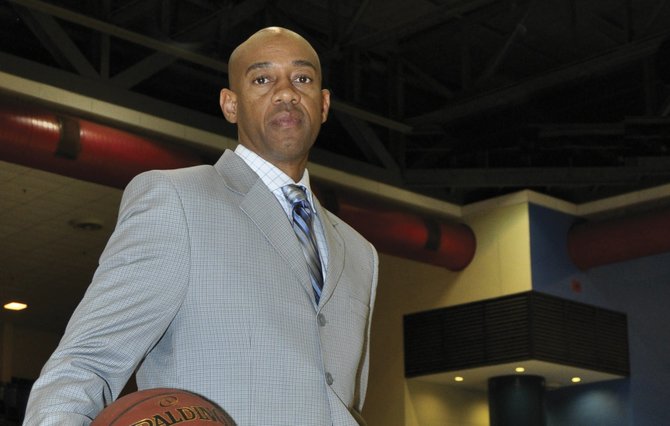
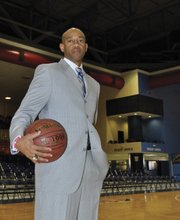
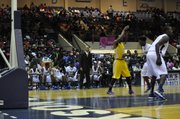
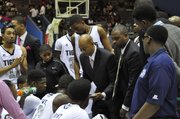
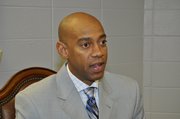

Comments
Use the comment form below to begin a discussion about this content.
comments powered by Disqus